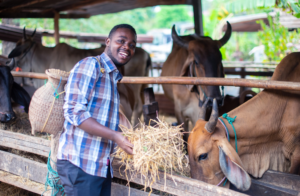Africans living in the USA invent a new way to create jobs in Africa

This post may contain affiliate links. Please read our disclosure page.
Africa is growing fast, but not fast enough for the millions of unemployed youth. “Good call, Captain Obvious! The sky is blue. And guess what? Water is wet!” I agree- the problem is well known. Perhaps we can talk about solutions instead. That is why in today’s post, I’ll share with you my analysis of Sakuti, a platform that is designed to address this very problem by connecting Africa’s innovators and entrepreneurs with the expertise, resources, and networks they need to scale their ventures. Well, why don’t you pull up a chair and get comfortable while I tell you all about it?
I’ll let you in on a little secret
You are probably aware that Africa’s insufficient development has not been for the lack of effort. Over the last 60 years, Africa has received more than a trillion dollars in aid, but the intended results are yet to materialize. But imagine if this was your company- constantly accumulating debt, burning through cash as if it grows on trees, and going for such a long period without an ounce of profitability! You’ll likely nudge the management out the door. Fire them! Or else you lose your shirt. Show me one country that has developed using endless cash donations or accumulating obscene debts. (I am waiting) I’ll let you in on a little secret: there isn’t any. (Did I hear dead aid?). There must be a better way! That’s why I am bullish about this new concept. It uses a tried and true method of economic development: innovation. Yes -you might say I am gung-ho about it!

Young Africans have the capability to make things that are currently imported and increase African products that can be exported. This will create local jobs, reduce forex pressures, and boost local economies across Africa.
One thing that has worked
By observing how countries around the world have historically developed, we know that one thing that has worked relatively well: supporting innovative thinkers to succeed in the ventures they already started. It is probably the fasted way to develop Africa. I would argue it’s the only measurable way. This is a tested formula worldwide. In the developed nations people do not wait for the government to create jobs. In the USA for instance, small businesses comprise 99.9% of all the businesses according to the SBA Office of Advocacy data. (Get to the point!) It’s the small businesses that make up the heart of the USA economy or the “backbone” as they call it. In addition, some of the many US companies we call “big” today were started just a few years ago in dorm rooms and garages by young people. Think Steve Jobs, Bill Gates, Mark Zuckerberg, Jeff Bezos, Mark Cuban, Elon Musk, Michael Dell, Pierre Omidyar, Bill Gates, Jerry Yang, Jack Dorsey, Evan Spiegel, Jack Ma, Larry Page & Sergey Brin and so on. Very young founders. (Where are the African founders?) Does this all make sense now? In the African context, small business means mostly innovators and upcoming entrepreneurs. Supporting these innovators and entrepreneurs to succeed will grow Africa’s small business capacity. And that’s the engine that will develop Africa. That is one thing that has worked when it comes to development! Now what?

Creating an outlet for local creators of goods and services provides reliable access to the market and ensures sustainable income for the local economy.
Let’s do a little experiment – adopt an innovator
You’ve probably heard this old saying by Lao Tzu: “Give a man a fish, and you feed him for a day. Teach a man how to fish, and you feed him for a lifetime.” Suppose you use your expertise and networks to help a young African innovator to build capacity and succeed in a venture that she has already started. There are countless ways to boost a young African innovator such as mentoring her on how to run her business effectively and efficiently to increase profits, helping her to build a website to reach more customers or introducing her products to a new customer base. ( Hang on! I will give a list of examples in a bit). Once successful, there is a high probability that the innovator will employ local people and show other innovators and entrepreneurs how to fish (the domino effect). So I say unto you. “Adopt an entrepreneur!”

( Growing capacity is a key part of sustainable economic development because the innovator can apply and grow knowledge perpetually. The innovator also teaches others as she grows her knowledge, and they too will teach others.
Taking this to a new level
Now, what if one million or ten million people do the same. They each mentor an innovator. That right there is the potential game-changer! But how can this be done, you ask? Unfortunately, no one has figured out how these types of dynamic connections can be implemented at scale. Well, until now! According to the Africa Economic Summit (AES), creators of Sakuti, the cultural networking platform is designed to do just that: flexibly bring Africa’s innovators, investors, and mentors to the same table to collaborate and innovate. You see my point, right? There are several reasons why this platform piqued my interest, but this capability is the kicker.

African technologists will be a major source of opportunity and growth across the continent as they create digital solutions for Africa’s industries and beyond.
Investor-Innovator matchmaking
Experts and global citizens from around the world who are interested in making a sustainable economic difference in Africa can now lend their skills pro bono to support Africa’s innovators, according to the New York-based AES. Notwithstanding the previous point, this can also develop into working relationships that can result in the business between innovators and the volunteers. A money-making opportunity can blossom with time. Once volunteers start donating their expertise and resources in support of the innovators and entrepreneurs, many of the responsibilities they are fulfilling on a part-time basis grow as the company grows. When the venture can afford it, these volunteers can convert into a more permanent and lucrative paid engagement. Likewise, investors who are providing advice and mentorship for these high potential African startups are usually the first to discover lucrative investment opportunities in them. Feel free to go off and start building the world’s next biggest business. (Don’t forget about us when you’re a big shot). Find these African “company founders”. So now that you have some sense of the ‘why’ and the “what”, let us move on to the ‘how’.

Connecting African startups with the capital and resources they need to grow is crucial to achieving mass innovation across Africa.
How does it work?
Once on the platform, an innovator indicates the skills and resources she needs to scale her venture. Similarly, mentors, investors, and experts around the world who are interested in making a difference in Africa will indicate what they’d like to offer: expertise, equipment, resources, networks, investments, and so on. Sakuti then connects the innovators with experts and investors who match their needs. I know what you are thinking. “Free stuff? People will run scams on the platform”. And you are right, that is always a risk on any platform. In Sakuti, I like that they have reduced this risk. Scammers will suffer reputational risk through bad ratings. This will weed out bad apples over time. If you still have this concern, working only with people who have a long history of operating and stellar reputation might be the best way to get started. Another way to reduce risk is to not give money but lend your expertise, which will be useless to a scammer but invaluable to an innovator.

Many volunteers are likely to form lifetime relationships with the owners of the businesses in which they volunteer
Many African innovators fly under investors’ radar.
The law of corruption (I made that up) dictates that only those with means and connections will get easy access to the good opportunities. If your father is not a nobleman, your reality is different. You’ll have a hard time getting any opportunities, even when you are the best candidate. In Africa, as in many of the emerging economies, there are layers and layers of gatekeepers who stand between the common person who is trying to make progress and available opportunities. These gatekeepers act like cartels or the mafia – they suck all the opportunities out of the system. If you are not in their inner circle you are locked out. Does this ring a bell? When is the last time someone from the government or position of power helped you to make progress towards your goals? Is the minister’s cousin more qualified than you for the position he put her in? It defies belief. Raise your hand if you know what I mean!
The result is always the same – if you are not in cahoots with the people in power, you’ll languish despite your talents. Your brilliant idea or solution could have helped your community or even the whole country make progress. But no one cares. And it’s not just the top government officials who have specialized in zero-sum gatekeeping. You may have to contend with the local chiefs, the police, some non-profits, think tanks, local officials, workers at the lands title office, self-appointed community leaders, corrupt judges and prosecutors, and so on. Even getting a license to open a business that will employ people and reduce unemployment directly may sometimes cost you a bribe. Isn’t It Ironic? (Yes, you have to bribe to create jobs). Succeeding in business is hard enough. More than 90% of all business startups fail, according to CB Insights. Now, imagine having to bribe someone for a 90% chance of losing your hard-earned money. Gods must be crazy! Consequently, many exceptional African innovators fly under investors’ radar. No one discovers their talent or their brilliant solutions. This status quo must be turned on its head. Now that my rant is over, let’s talk about solutions.

As the African middle class grows, there is a great need to have local business owners provide services that the middle class wants to enjoy and not wait for the multinational corporations to provide those services. This way, the profits stay within the local economy.
Connecting the Dots
What if you can turn this into a shark-tank-like-process where you partner with some of Africa’s innovators? This provides a great opportunity for investors to get in on the ground floor. I am talking about thousands of young Africans with the ability to create new products and services that dramatically improve people’s lives – not just in Africa but around the world. These “founders” are the proverbial “Diamonds in the rough”. You could develop a relationship with remarkable producers of goods or service providers you didn’t know existed. Thousands of African innovators and entrepreneurs today dream of having direct access to investors. At the same time, there are thousands of investors who are eager to find promising African startups to invest in. Matching these two groups is one way to addresses long-standing issues for both camps. Not rocket science, right?

With Sakuti, you are in charge. You decide and pick the types of companies that you’d like to support. You can select companies that care about what you care about – companies that are building the kind of world you’d like your children to grow up in.
Africans in the diaspora
One does not have to be African to use the platform or support Africa’s innovators. But I am hoping this message will reach Africans in the Diaspora, especially those in the USA. They know a thing or two because they have seen a thing or two (thousand!). Many Africans in the diaspora already send money to Africa. Sometimes the money helps. In other cases, it ends up in some bottomless pit. Rethinking where you put your resources is important. In the same way that the president of the country may not be wise to appoint his grossly unqualified brother to head the Ministry of Health, trying to prop up your drunkard cousin or uncle to start a business may not yield good returns. It helps to give the job to the person who can do it best. I hope this thinking resonates with you. By collaborating with upcoming innovators, Africans in the diaspora can have something to show in developing Africa and better returns on their investments. (That sounds like a win-win proposition to
me!). The idea is not to throw money into issues but to build perpetual problem-solving capacity instead (fishing, not fish). That’s pretty incredible if you ask me!

Knowledge transfer between Africans in the diaspora and Africa’s innovators and entrepreneurs will accelerate progress and prosperity across Africa in ways not thought possible before.
Here are 30 things you can do to help Africa’s innovators and entrepreneurs. (Many of these can be done without breaking the bank.)
1. Become an investor/mentor/Volunteer
2. Become a customer – Similar to how the best way to support Apple is to buy Apple products, the best way to support Africa is by buying African goods and services from Africa’s innovators.
3. Refer other people to their products or services- they are going to buy, why not buy from Africa’s innovators (support the underdogs).
4. Provide technical or business management know-how
5. Write a product review
6. Tell them about valuable events for entrepreneurs and innovators
7. Give them ideas to expand their venture
8. Provide direct feedback on things that need to be improved
9. Distribute their product
10. Assist in product validation
11. Assist in establishing a structure
12. Help the innovator establish collaboration with the competition
13. Offer to be part of Beta test groups for new products or services
14. Help an innovator deal with the competition
15. Assist innovator to establish or expand networks
16. Help them create publishable content
17. Help in expanding the customer base
18. Help an innovator to develop confidence
19. Help innovator to develop an innovation strategy
20. Help to scale up production
21. Develop a coherent marketing plan
22. Development of market-relevant skills
23. Give them access to your network
24. Provide an internship opportunity
25. Help open-up export markets
26. Help in creating a business plan
27. Design them a simple website
28. Perform market research
29. Support job accelerator venues like Sakuti
30. Refer innovators/mentors/investors, global citizens to the innovation matchmaker
I should add that the above are just examples, I am sure you can think of many more.

With over 600 million hectares of uncultivated arable land, about 60 percent of the global total according to CNN, Africa could be the world leader in organic farming.
Rude awakening for Diaspora Africans returning home
Most people are in diaspora because opportunities were scarce back home. Many Africans who are returning home now are finding that opportunities are still elusive. It is possible to return home and find out the only thing that has changed is you and your age. What if you could help to create more opportunities back home? This is important because a rising tide will lift all boats. Some of those opportunities may one day be your lifeline. At a minimum they could benefit your cousin who has been on a job hunt for the last few years. So there you have it! Did I just see a head nod?

While traditional markets are a staple in many African communities, adopting more contemporary marketplaces such as Sakuti will more efficiently give innovators and entrepreneurs’ greater reach to new customers and markets, increasing their incomes and enhancing the quality of life for families.
This is an innovation
Sakuti itself is a new African innovation and its success will depend on you. If you slightly believe Africans should come together in order to make an impact on the continent, supporting Sakuti is a great start. I hope you’ll share this piece with a few people. If you are slightly tired of Africa being treated like the ashtray continent you must do something about it. The wisdom of all of us will triumph over the wisdom of a lone genius (or a few geniuses). Getting more people and their ideas to shape the future of the continent in a coordinated manner is the true genius of the Sakuti innovation. We agree that better governance is needed. Yes, we need more “Madibas” and fewer “men divas”. (Well, and fewer Divas) Before you shout “colonialism!”, be advised that I have already priced-in Africa’s historical injustices in this argument. All things considered, one of the main reasons why Africa lags behind other continents is disunity. We do not always support each other (Shhh! that’s just between us). By the way, when is the last time you supported a fellow African? (Don’t worry, I will not tell on you). Still, I believe Africa can fully “innovate and entrepreneur its way” out of its current problems. Sakuti makes it easy to connect with likeminded Africans and global citizens to do just that. Instead of always trying to catch the falling knives (feels like it) or awaiting some external savior to rescue us, together we can shape our destiny. Let’s try some offensive moves. Supporting this innovation is such a move. Oh, and if you know someone who may find this content helpful, feel free to share! (Hmm…I said that already, didn’t I?)

Young Africans have the intelligence, creativity, and resilience to rebuild Africa for the 22nd century. With them leading the way, global investors will achieve great returns while doing good and moving humanity forward.
People want to help – Rethinking philanthropy
Many people around the world want to make a difference, including to help Africa advance economically. In 2019 alone, Americans gave $427 Billion according to Giving USA. That is a lot of goodwill. However, most of these funds go through intermediaries and the actual givers cannot point to an outcome that their contributions helped to effect. Don’t be fooled by the tales of woes and heartbreaking pictures of destitute African kids used to beg for your money. The images of Makoko, Old Fadama, Kibera, and Soweto have always been a cash cow. Most of the money raised does not always go to the intended causes according to the Tampa Bay Times. Now, what if you and others kept 10% of their giving and directly supported an innovator who is working on a solution that will change lives. That alone would make $42 Billion available for this purpose each year. Lives of tens and perhaps thousands of people can be materially improved from your giving alone. Imagine what an effective and efficient group of innovators and entrepreneurs can do with $42 Billion each year. You can then take pride and satisfaction for changing the world in your small way. Without exaggeration, you can say “I made that happen…I helped make these people’s lives better”. Do you see how huge this is? I hope this post has inspired you to reach out and help someone in a small way.

Young Africans can start businesses that require low capital, instead of spending years on a job search scouting for thinly dispersed jobs. Running a business however small will teach Africa’s Youth valuable skills that they can apply to new opportunities or to grow the business. Learning by doing is the best way to learn. It is the best way to build capacity across the continent
Giving back to the motherland
The total African Diaspora worldwide is around 140 million if you count all people of African ancestry living outside the continent. Many want to make a meaningful contribution to the motherland, but most people are generations removed. (For the umpteenth time, It’s Ghana not Guyana!). They have no direct connection to the continent. They don’t know where to start. A platform like this will give those who have a desire to give back a way to engage directly with people on the continent, without needing to go through intermediate organizations (Oh the mighty gatekeepers). Since you don’t need to have African ancestry to participate, experts and global citizens around the world can do the same. The fact that you are reading this right now tells me you care about the future of Africa. (Gosh this is a long post!)

African artisans are some of the best craftsmen and women in the world. With access to markets, African could be a leader in handcrafted luxury goods.
Do you know an innovator?
You probably have encountered some brilliant African innovator or entrepreneur who you wanted to help, but you did not how to do it. Now you can direct them to a platform where they can potentially get resources or guidance to turn their ideas into innovative solutions that move Africa and humanity forward (Far much better than blocking them). Alternatively, you probably know of some people who would like to help. You can direct them to Sakuti to be matched with the right innovators or entrepreneurs. How awesome is that?

Instead of importing high-quality furniture from Italy and elsewhere, locally-made furniture can match the quality of imported furniture, provide better customer support (such as in-home installation, and free repairs), while creating local jobs.
A Job Accelerator Platform
I am aware that African economies are infinitely complex. That does absolve me from looking for ideas that may boost overall business and employment into the future. We have an ethical and moral obligation to try to help the new generation. Arguing that money doesn’t grow on trees is not a valid excuse. (You can’t prove it doesn’t). Kidding aside, if you have a job accelerator idea like the one featured in this article please let us know or partner with Africa Economic Summit (AES), the creators of Sakuti. I will provide some links below.

Making more things that Africans use every day such as clothing, shoes, blankets, bedsheets, beauty products, etc. (vs. importing them) is an important component of creating sustainable local jobs.
Other benefits of Sakuti
I have a separate piece on some of the other benefits of Sakuti. In that article I explained how Sakuti provides the African Youth with a place to find a reliable customer base for their goods and services, raise capital, and highlight the continent’s talent. The platform also provides a way for generations of Africans in the diaspora to reconnect with their heritage. You can read it here.

Africans need to tell their stories from an African point of view. Building content and movies with African cultural context presents a big opportunity to entertain and educate the world about Africa. Local content production also creates jobs for local talent – actors, directors, producers, costume makers, fashion designers, musicians, and so on.
Here is to a brighter future!
We can probably agree that our current system for developing Africa is hopelessly ineffective (insert eye roll here). Africa is nowhere near ready to deal with the tsunami of jobless youth already underway. Since we have agreed that handouts and debt accumulation are a recipe for failure, let’s talk about longer-term solutions. Ready or not technology will be the main driver of change around the globe. People with a strong desire to contribute to Africa’s progress, including Africans in US Diaspora, can now do things that were not possible a few years ago: connect with upcoming innovators directly to enable their success. A platform like Sakuti can help democratize economic development by “uberizing” the donation of time and other resources and matching them to remarkable innovators across Africa. This is just what the doctor ordered!

The world will reap great benefits as we engage African ingenuity to build the world we all wish our children could grow up in.
What have we learned today, class?
If there is one thing that can elevate the lives of the new generation of Africa’s innovators and entrepreneurs, it is one-on-one engagement with the right people from around the world who can help these innovators succeed. I should repeat that it is one way that has worked. I would argue it’s the best way. We are not re-inventing the wheel here. Innovation is what has been used to develop many nations. Mass innovation is what Africa needs to prosper. There are also dozens of stories of African innovators who have been able to expand their ventures using this method. We’d like to get millions of more successes.

With your help, Africa will be the land of abundance. The new generation of Africans will help to shape human progress, African style.
This concept is a great start. It is not a panacea for all the problems (I am not that naïve). Still, I like that it creates a space to harness our individual efforts into collaborative collective action for a greater impact. I like that it reduces the barriers for you and me to meaningfully contribute towards Africa’s innovation and prosperity. With that, I rest my case, your honor. I know that’s a lot to take in, but bear with me. If you can relate to this post in any way, hopefully, you’ll find the links below useful.
To learn more about Sakuti Platform check out its website here.
To learn more about Africa Economic Summit check out its website here
Related:
Meet Sakuti, Africa’s cultural networking and marketplace platform
Shocking Data: The 2 million Africans living in the USA May Never Retire
Mahugu Nuthu is a content creator known for his compelling and well-researched business analysis. His blog MHGcode.com provides insights and proven strategies for effective entrepreneurship, side hustle hunting, passive income pursuit, small business ideas, saving, and tips on slashing costs.
This information is for educational and entertainment purposes only. The information that is shared on MHGcode.com shall not be interpreted or construed as financial, accounting, legal, or tax advice and should not be acted upon without further professional advice.





